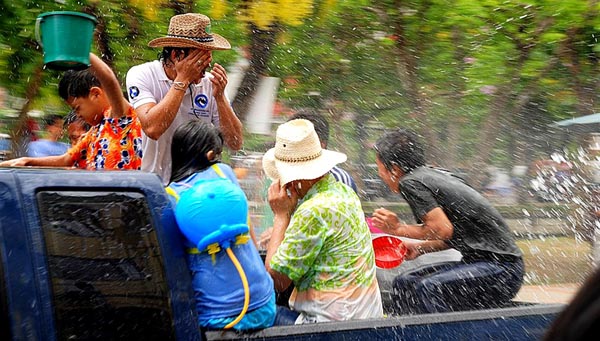 |
| Water-throwing on Songkran in Thailand (Wikipedia) |
Note: New Years is one of the world's most widely celebrated holidays, and it's celebrated in a wide variety of ways! As an example, notice the flinging of water in some Buddhist countries.
Get Ready: Have you ever been in a "water fight"? What was it like?
Perhaps the most universal holiday is the celebration of the New Year. Though the traditions--and the dates--vary widely, it seems every culture recognizes a "resetting of the clock."
The Romanian historian of religions Mircea Eliade says that the ancient Babylonians had such a celebration in which the world was reduced to chaos at New Year (think of the "Topsy Turvy Day" we learned about in Lesson #05-003). Then the god named Marduk killed the chaos-monster called Tiamat, creating a whole new world.
Eliade called the New Year illud tempus, "that time"--that is, the sacred time outside of time. Then, as the new year progressed, it became increasingly profane, until the time came for another renewal.
One of the most popular observances of the New Year goes under many names, but here we will use one of the most familiar: Songkran. It is celebrated across a wide area occupied by followers of Theravada Buddhism, including Cambodia, Laos, Myanmar, Sri Lanka, Thailand, parts of northeast India and Vietnam, and amongst the Dai people in the Xishuangbanna area of China.
(The Theravada has been called, pejoratively, the Hinayana, or "Small Vehicle," to distinguish it from the Mahayana, or "Large Vehicle" Buddhism practiced in East Asia. "Theravada" is a more positive term, meaning "The Way of the Elders.")
The name "Songkran" comes from a Sanskrit word, sankranti. It means the transition of the sun from one constellation (used as a zodiac sign) to another. Technically there are twelve sankrantis in a year. This one is the Mesha Sankranti as the sun enters Aries in mid-April.
Thus, Songkran is usually celebrated from April 13th to the 15th, and its most famous features is the sprinkling, pouring, or outright throwing of water on others.
This has a two-fold symbolism. It is both a purifying, and also a return to the chaos of the primordial waters, consonant with Eliade's ideas.
Another reflection of his thoughts is the custom in Laos of recognizing the first day of the celebration as the last day of the old year, the last day as the first day of the new year, and the middle day as the "Day of No Day"--a day outside of time, like Eliade's illud tempus.
--------Read more: https://en.wikipedia.org/wiki/Songkran
Practice: Match the term to its definition below:
- chaos
- constellation
- outright
- pejoratively
- primordial
- profane
- resetting
- sacred
- universal
- zodiac sign
- total; without reservation
- a state of complete disorder
- shared by everyone
- insultingly; rudely
- dating to the very beginning of time
- of a special character; holy
- starting again
- a constellation that people believe influences their lives, based on the time they were born
- an imagined animal or other figure formed by stars
- unholy; not sacred
Answers are in the first comment below.
Submitted to the Shenzhen Daily for April 3, 2017


Answers to the Practice: 1. b; 2. i; 3. a; 4. d; 5. e; 6. j; 7. g; 8. f; 9. c; 10. h
ReplyDelete